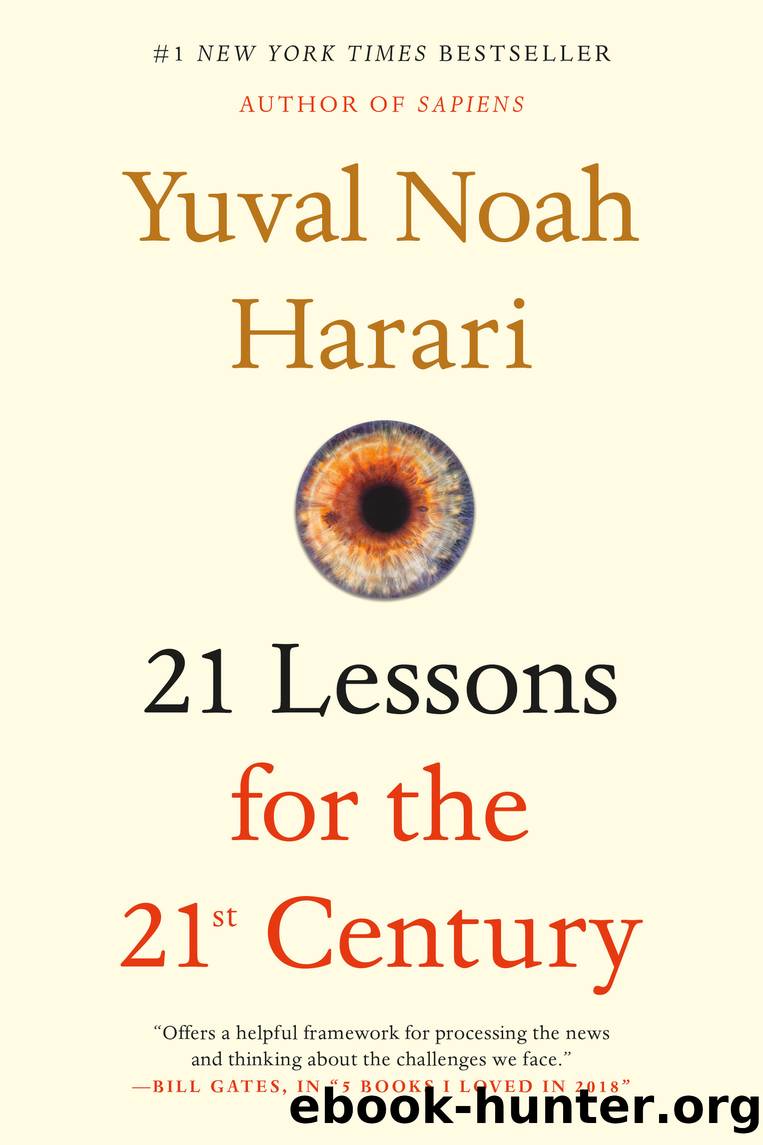21 Lessons for the 21st Century (9780525512189) by Harari Yuval Noah

Author:Harari, Yuval Noah [Harari, Yuval Noah]
Language: eng
Format: epub
Publisher: Random House Digital
Published: 2018-09-04T00:00:00+00:00
THE LOST ART OF WINNING WARS
Why is it so difficult for major powers to wage successful wars in the twenty-first century? One reason is the change in the nature of the economy. In the past, economic assets were mostly material; therefore, it was relatively straightforward to enrich yourself by conquest. If you defeated your enemies on the battlefield, you could cash in by looting their cities, selling their civilians in the slave markets, and occupying valuable wheat fields and gold mines. Romans prospered by selling captive Greeks and Gauls, and nineteenth-century Americans thrived by occupying the gold mines of California and the cattle ranches of Texas.
Yet in the twenty-first century only puny profits can be made that way. Today the main economic assets consist of technical and institutional knowledge rather than wheat fields, gold mines, or even oil fields, and you just cannot conquer knowledge through war. An organization such as the Islamic State may still flourish by looting cities and oil wells in the Middle East—it seized more than $500 million from Iraqi banks and in 2015 made an additional $500 million from selling oil—but for a major power such as China or the United States, these are trifling sums.7 With an annual GDP of more than $20 trillion, China is unlikely to start a war for a paltry billion. As for spending trillions of dollars on a war against the United States, how could China repay these expenses and balance all the war damages and lost trade opportunities? Would the victorious People’s Liberation Army loot the riches of Silicon Valley? True, corporations such as Apple, Facebook, and Google are worth hundreds of billions of dollars, but you cannot seize these fortunes by force. There are no silicon mines in Silicon Valley.
A successful war could theoretically still bring huge profits by enabling the victor to rearrange the global trade system in its favor, as Britain did after its victory over Napoleon and as the United States did after its victory over Hitler. However, changes in military technology make it difficult to repeat this feat in the twenty-first century. The atom bomb has turned victory in a world war into collective suicide. It is no coincidence that ever since Hiroshima, superpowers have never fought one another directly, instead engaging only in what (for them) were low-stakes conflicts, in which the temptation to use nuclear weapons to avert defeat was small. Indeed, even attacking a second-rate nuclear power such as North Korea is an extremely unattractive proposition. It is scary to think what the Kim family might do if it faces military defeat.
Cyberwarfare makes things even worse for would-be imperialists. In the good old days of Queen Victoria and the Maxim gun, the British army could massacre the fuzzy-wuzzies in some far-off desert without endangering the peace of Manchester and Birmingham. Even in the days of George W. Bush, the United States could wreak havoc in Baghdad and Fallujah while the Iraqis had no means of retaliating against San Francisco or Chicago.
Download
This site does not store any files on its server. We only index and link to content provided by other sites. Please contact the content providers to delete copyright contents if any and email us, we'll remove relevant links or contents immediately.
What's Done in Darkness by Kayla Perrin(25790)
Shot Through the Heart: DI Grace Fisher 2 by Isabelle Grey(18451)
Shot Through the Heart by Mercy Celeste(18363)
The Fifty Shades Trilogy & Grey by E L James(17989)
The 3rd Cycle of the Betrayed Series Collection: Extremely Controversial Historical Thrillers (Betrayed Series Boxed set) by McCray Carolyn(13435)
The Subtle Art of Not Giving a F*ck by Mark Manson(13244)
Scorched Earth by Nick Kyme(12094)
Stepbrother Stories 2 - 21 Taboo Story Collection (Brother Sister Stepbrother Stepsister Taboo Pseudo Incest Family Virgin Creampie Pregnant Forced Pregnancy Breeding) by Roxi Harding(11638)
Drei Generationen auf dem Jakobsweg by Stein Pia(10422)
Suna by Ziefle Pia(10346)
Scythe by Neal Shusterman(9541)
International Relations from the Global South; Worlds of Difference; First Edition by Arlene B. Tickner & Karen Smith(8907)
Successful Proposal Strategies for Small Businesses: Using Knowledge Management ot Win Govenment, Private Sector, and International Contracts 3rd Edition by Robert Frey(8673)
This is Going to Hurt by Adam Kay(8086)
Dirty Filthy Fix: A Fixed Trilogy Novella by Laurelin Paige(6699)
He Loves Me...KNOT by RC Boldt(6084)
How to Make Love to a Negro Without Getting Tired by Dany LaFerrière(5883)
Interdimensional Brothel by F4U(5559)
Thankful For Her by Alexa Riley(5426)
